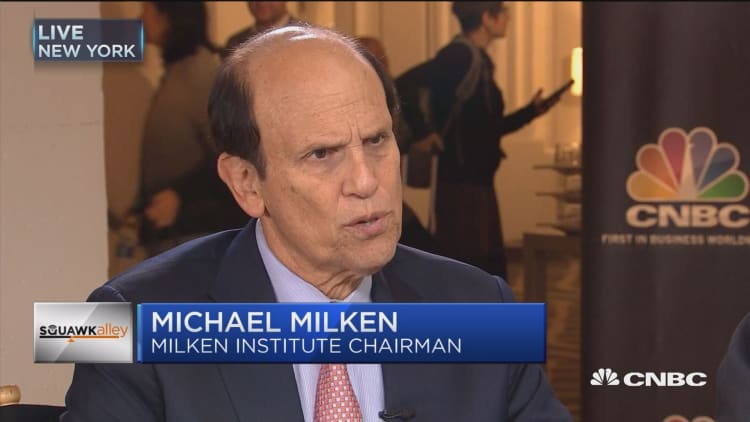The March for Science, happening Saturday in more than 600 cities across the world, is an explicitly political movement. But it's trying hard to be seen as nonpartisan.
"The goal of the march itself is to highlight the valuable public service role science plays in society and policy and demonstrate the deep public support for science," the organizers say on the March's website. "We take strong stands on policy issues based on the best available scientific evidence, but we will not let our movement be defined by any one politician or party."
Still, the idea for a science march originated after the election of President Donald Trump, whose views on climate change (calling it a hoax perpetuated by China), vaccines (repeating discredited claims about their safety) and aid workers helping fight Ebola in Africa ("People that go to far away places to help out are great — but must suffer the consequences!") have rattled the scientific community.

And that presents a bit of a conundrum for the drug industry — dependent on support for science, but heavily regulated by the government.
"A march on Washington under the idea of a march around science could be considered a partisan protest of the Trump administration," said Brian Skorney, an analyst with Robert W. Baird. "I think the industry's careful that they don't want to be seen as an opposition force."
Drug companies have a lot at stake when it comes to the U.S. government, Skorney pointed out. They depend on the Food and Drug Administration to evaluate their products, and are already enduring onslaughts of pressure around their pricing.
So they're proceeding with caution. But they are proceeding.
The March for Science in Boston counts biopharma companies Intellia Therapeutics, Tetraphase Pharmaceuticals and Warp Drive Bio among its sponsors. In San Francisco, Alphabet's life sciences company Verily is on the list.
And it's not just younger, smaller life science companies supporting the march. Drug giant Pfizer is in, too, producing a video proclaiming: "Let's not imagine a world without science. Our scientists are the cornerstone of what we do. We're proud to stand behind the #ScienceMarch."
Some biotech execs say the issues are too important not to stick their necks out.
"Our team at Verily feels strongly that science has been undermined of late," Tom Insel, Verily's director of clinical neuroscience, said. "We feel it's important to highlight two things: science offers us as a society tools to search for truth and avoid 'group think,' and that the U.S. federal investment in science is unique and important, and we feel we should actively encourage continued investment."

As part of his budget proposal, Trump moved to slash funding for the National Institutes of Health by 20 percent, or almost $6 billion.
That's one of four issues highlighted by Alnylam CEO John Maraganore as reasons to support the march. Between 70 and 100 employees of Alnylam will be there, according to spokeswoman Christine Lindenboom.
"I think it stands for a gathering of a group of people to express their views under a set of circumstances where diversity is under attack, where the facts of climate change are being challenged, the NIH budget is being proposed to be shrunk, and where FDA standards on efficacy and safety are being questioned," Maraganore said in a telephone interview Friday. "These are science-based philosophies and views that are truly being questioned right now."
Alnylam, along with industry group MassBio and the Kendall Square Association, is also organizing a photo shoot in the Kendall Square biotech hub of Cambridge, aiming to highlight the diversity in the life sciences industry — an issue that also has political underpinnings given Trump's immigration policies.
"The travel ban and immigration ban proposed by the administration are something we are strongly against," Maraganore said. "The fact that it discriminates against religions and the quality of people we like to bring into our companies from all parts of the world — that's a feature on diversity that we are all in solidarity and agreement with."
Many life sciences companies declined to officially back the march, leaving participation up to individual employees.
Steve Holtzman, CEO of Cambridge, Massachusetts-based startup Decibel Therapeutics, said he asked an internal group at his company to come up with a position on the march.
"They reached a conclusion that the company should not endorse or sponsor out of respect that, unfortunately, the march will be viewed in the current environment as partisan and that out of respect for those that may not share partisan views in the company that the company ought not to do it," Holtzman said. But, he said, "a lot of people from the company will be there."
Holtzman is speaking at the March for Science in Boston. And he's not shy about his views.
"If you take certain positions — denying climate change would be an example; questioning the validity of a wealth of evidence that vaccinations don't cause autism; speaking in terms of alternative facts as if facts are things which are merely opinions," Holtzman said, they "run in the face of well-established science."
Other execs, while supporting the march, aim to sidestep the politics as much as possible.
"The idea of a nonpartisan group that gets together and thinks about — on an international scale — how to promote science and science policy resonates well with certainly myself and a number of employees," said Gene Kinney, CEO of Prothena, a Dublin-based biotech with about 100 employees.
Kinney said about 45 employees at Prothena plan to participate in marches in Dublin and San Francisco.
"How we look at this march is it's more of an opportunity to focus on policy around science rather than what any individual administration's policy is," Kinney said in a telephone interview. " I would be equally enthusiastic regardless of who was in the White House."
But some observers question the upside.
"There's an essence of the March for Science that's preaching to the choir and unlikely to convert anyone," Baird analyst Skorney said. And the downside? "There's so many factors that are to some extent in government control, you don't want to antagonize the powers that be."
And even if there is risk of retaliation from a president quick to take offense and turn to social media, Alnylam's Maraganore said standing up for science is the right thing to do.
"At the end of the day, most companies will agree that you just can't sit back and be quiet and live in fear of a tweet," Maraganore said. "That's simply not a way that we should roll in this country."
Watch: Neil DeGrasse Tyson on value of science


